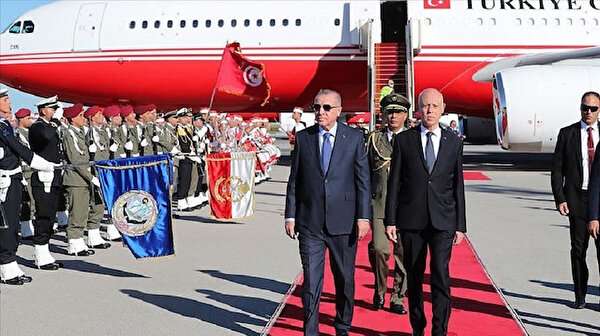After the ouster and death of Libya's long-ruling leader Muammar Gaddafi in 2011, two seats of power emerged in Libya. One in eastern Libya led by ret

After the ouster and death of Libya’s long-ruling leader Muammar Gaddafi in 2011, two seats of power emerged in Libya.
One in eastern Libya led by retired Gen. Khalifa Haftar supported mainly by Egypt and the United Arab Emirates (UAE), and another in Tripoli, which enjoys UN and international recognition, known as the Government of National Accord (GNA).
On April 4, Haftar launched an offensive to capture Tripoli which the GNA responded to with the Burkan Al-Ghadab (Volcano of Rage) Operation.
Turkey has exerted efforts to gather international and regional support for the GNA. It urged support for the GNA in the face of Haftar’s offensive.
Neighboring Tunisia is affected by what is going on in Libya. It is in its interest to secure its borders with Libya and ensure political stability.
Turkish-Tunisian consensus
Following the sudden visit by Turkish President Recep Tayyip Erdogan to Tunisia where he met his counterpart, Qais Saied, Erdogan announced the two nations agreed to provide political support to the UN-recognized GNA.
Erdogan said Turkey and Tunisia agreed to ensure stability in Libya. Tunisia has a strong position on the international level, being elected in June as a non-permanent member of the UN Security Council for 2020-2021.
After Erdogan’s visit, the Tunisian presidency said that its support to GNA Prime Minister Fayez Al-Sarraj derives from international legitimacy which recognizes the GNA as Libya’s legitimate government. It also confirmed Tunisia’s support to finding a peaceful solution to end the fighting.
Both Turkey and Tunisia have the same understanding represented in supporting the GNA’s international legitimacy and seeking a reconciliation process among Libyan rivals.
Unpleased visit for Haftar’s supporters
Although there were no talks or agreements on military pacts or cooperation during Erdogan’s visit, media outlets of Haftar and his supporters, especially the Egyptian-run media, were not happy with the visit and launched smear campaigns against it.
Notorious pro-Egyptian regime anchor Ahmed Mousa is an example of such campaigns. He claimed Erdogan’s visit sought to gain military support from Tunisia and launched a wave of warnings to Tunisians about the alleged support.
Pile of lies
GNA Interior Minister Fathi Bashagha told a press conference that a Turkish-Tunisian-Algerian alliance was formed to support the Libyan government.
Despite the denial of such an alliance by the Tunisian presidency, Haftar media outlets worked systematically to twist the Turkish president’s visit to demonize Turkish-Tunisian cooperation.
Ahmed Al-Mesmari, a spokesman of Haftar’s forces who usually appears in Egyptian and UAE media outlets, alleged that Tunisia and its parliament allowed the flow of terrorists to Libya through its airports.
Mustafa Bakri, an Egyptian parliament member, made similar claims, attacking Turkey and its cooperation with Tunisia through his talk show on Egyptian television.
Accusations by social media activists who are loyal to the UAE and Saudi Arabia, including Yusuf Allawna and Monther Al Sheikh Mubarak, disseminate false reports that Turkey is using Tunisia to bring weapons to GNA forces.
No search for solution
Muhanna al-Jubail, a political analyst, said the UAE is sustaining infighting in Libya to prevent the establishment of genuine national unity and social stability.
Under the pretext of terrorism, Haftar and his supporters have reiterated they will not engage in talks with the GNA, and declared the continued offensive to topple the GNA.
Following his arrival to Ankara from Tunisia, Erdogan vowed to provide support to the Tripoli government against Haftar, who is supported by various European and Arab countries.
Erdogan said he would present a bill to deploy troops to Libya when Turkey’s parliament reopens in January.
As Haftar continues his offensive against the GNA, the Libyan people are paying the price for his greed and ambitions. So far, according to UN data, more than 1,000 people have been killed since the start of the operation in April, with more than 5,000 injured.